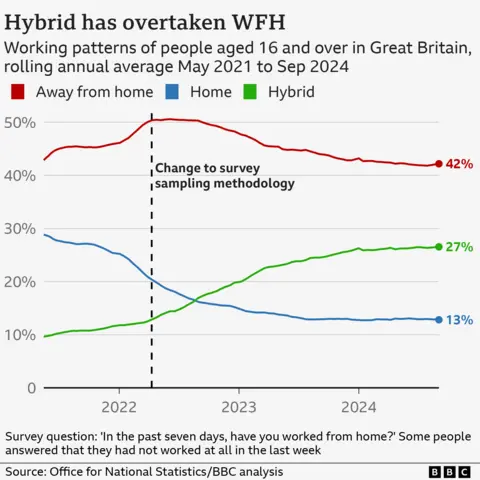 BBC
BBCThey are two competing views on where desk-based employees work best.
Amazon is ordering its staff back to the office five days a week, just as the government is pushing for rights to flexible working – including working from home – to be strengthened.
The tech giant says employees will be able to better “invent, collaborate, and be connected”.
But just as the firm’s announcement became news, the UK government was linking flexibility to better performance and a more productive, loyal workforce.
Few are short of an opinion on how effective working from home is and for a government there are broader considerations such as how, for example, caring responsibilities are affected.
But more than four years since the start of the pandemic, what does the evidence tell us about how we work best and is Amazon right to believe people being in the office full time will allow them to collaborate better?
Amazon’s fellow tech giant Microsoft studied its employees during the pandemic. It looked at the emails, calendars, instant messages and calls of 61,000 of its employees in the US during the first six months of 2020. The findings were published in Nature Human Behaviour.
The study indicated that, during Covid, remote workers tended to collaborate more with networks of colleagues they already had, and that they built fewer “bridges” between different networks.
There was also a drop in communication that happened in real time – meetings that would have happened in real life weren’t necessarily happening online. Instead, more emails and instant messages were sent.
The authors suggested this may make it harder to convey and understand complex information.

Microsoft’s was a data-led study. But what about human experience?
A 2020 survey by the Chartered Institute of Personnel and Development (CIPD) of 1,000 senior decision-makers in organisations found about a third struggled with “reduced staff interaction and cooperation”.
However, more than 40% of the managers said there was more collaboration when people were working from home.
Greater collaboration is hard to object to, but equally it is no guarantee of productivity.
In 2010, China’s biggest travel agency CTrip tried something very new among staff in its airfare and hotel booking department.
Almost 250 staff were identified as potential home workers – they needed to be established at the company and have a proper home working set-up.
Around half that group started working from home. The other group stayed office-based.
Researchers at Stanford University found the workers were 13% more productive when working from home – mainly because workers had fewer breaks and sick days, and they could take more calls because it was quieter.
Communication barriers
There was a particularly significant drop in staff quitting for non-managers, women, and people with long commutes, the researchers said.
However, those Chinese home-workers were seeing a bit of the office: they were spending one day a week among colleagues. It could be this brought some benefit – a separate study years later from researchers at Stanford suggested fully remote work can lead to a 10% drop in productivity compared with working in the office all the time.
Barriers to communication, lack of mentoring for staff, problems building a work culture, and difficulties with self-motivation were all cited.
Amazon is not alone in telling employees to return to the office full-time.
Goldman Sachs chief executive David Solomon famously described working from home as an “aberration”. The US firm requires bankers to be in the office five days per week.
Rival US banks JPMorgan and Morgan Stanley have also backed workers returning to the office, whereas some banks in Europe have taken a softer approach.
Elon Musk’s Tesla also requires employees to be in the office full time, leading to reports of problems finding space for them.
Another Musk company, SpaceX, brought in a policy requiring workers to return to the office full-time.
But it wasn’t without consequences: when it brought the policy in, SpaceX lost 15% of its senior-level employees, according to a study published earlier this year.
The pandemic changed work routines that were in many cases decades old.
Linda Noble, now 62, from Barnsley, was used to putting on a suit and make-up. In 2020 she was a senior officer in local government, scrutinising governance in the fire service and the police service.
Then Covid struck and she was working from home.
“I loathed it. I missed the communication – going into work, someone would make you smile,” she says.
But with time, Ms Noble adjusted. She set up her home office and she thinks that before long she was twice as productive as previously – even if that was in part because of an inability to switch off.
Many disabled people also believe working from home makes them more productive.
A 2023 study of 400 people suggested that disabled workers felt they had more autonomy and control when working from home, which led them to better manage their health and wellbeing, and 85% felt more productive.
Perhaps unsurprisingly, not all studies come to the same conclusions. Some suggest an improvement to physical health from working at home, others disagree. The same goes for mental health.
The wellbeing of staff was a key reason one UK business decided to get them back to the office as soon as possible after lockdown restrictions ended, according to one of its directors, Francis Ashcroft.
Part of a team
He was chief executive of a large private UK children’s care services company. He says “some people were struggling with raised anxiety” and wanted to get back to the office “to be part of a team”.
Mr Ashcroft said there was “also a recognition that 80% of staff were at the coalface”, working in person in children’s homes and education, and so it was “right to come back” for reasons of fairness.
Although team members were collaborating online at 95% of what they had been, “coming back into the office added that 5% back”, he argues.
“It brought a realness and a sense of belonging,” Mr Ashcroft says, adding that “when it comes to delivering a service, the teamwork was much better in the office”.
Despite this experience, an umbrella review of home working that examined a range of other studies concluded that, on the whole, working from home boosts how much workers can get done.
What difference there is in approach between the government and Amazon essentially boils down to whether or not some home working should be part of the mix, with Amazon believing it shouldn’t.
Linda Noble’s time solely working from home is over. She is just about to start a hybrid job. She’s attracted by the “balance” between working from home and office work.
Reduce churn
According to the CIPD, benefits of hybrid working include “a better work/life balance, greater ability to focus with fewer distractions, more time for family and friends and wellbeing activity, saved commuting time and costs, plus higher levels of motivation and engagement.”
And it may be that this can reduce staff churn. A study published this year found that a Chinese firm that adopted hybrid working reduced the rate at which employees quit by a third.
From an employee perspective, the optimum time for hybrid working is three days in the office – this makes employees most engaged, according to a Gallup survey of US workers, although it also says there is “no one-size-fits-all”.
In the UK, the number of people exclusively working from home is falling. But, crucially, hybrid working is continuing to rise, running at 27% of the working population.
Gallup says that despite highly publicised moves by firms to get employees back in the office, the underlying trend is that the future of office work is hybrid.
This tallies with the position of the UK government, which is clear that it believes the potential to work at home drives up productivity.
The calculation by Amazon appears to be that what evidence there is for increased productivity among employees who work in part from home fails to capture the particulars of how they operate.
BBC InDepth is the new home on the website and app for the best analysis and expertise from our top journalists. Under a distinctive new brand, we’ll bring you fresh perspectives that challenge assumptions, and deep reporting on the biggest issues to help you make sense of a complex world. And we’ll be showcasing thought-provoking content from across BBC Sounds and iPlayer too. We’re starting small but thinking big, and we want to know what you think – you can send us your feedback by clicking on the button below.














